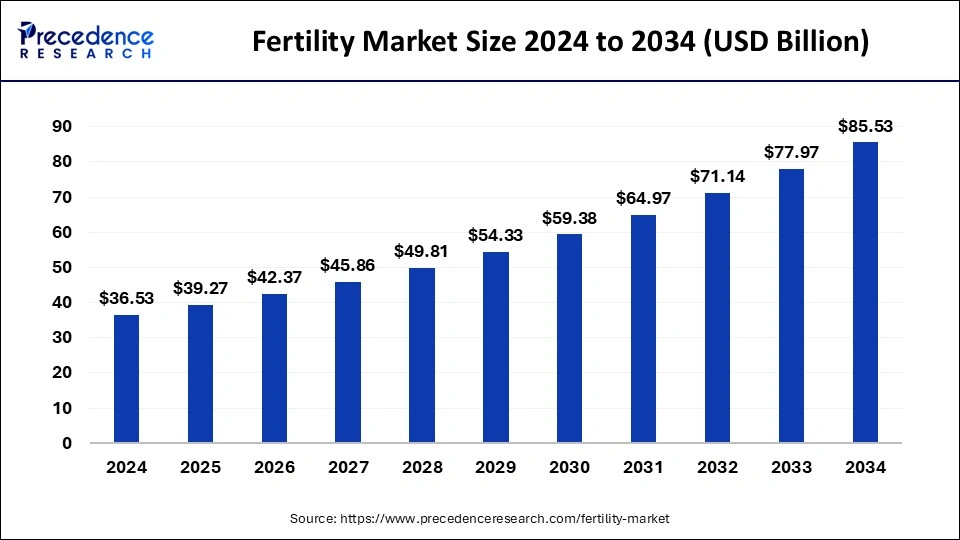The global fertility market size was valued at USD 36.53 billion in 2024 and is projected to grow from USD 39.27 billion in 2025 to approximately USD 85.53 billion by 2034, expanding at a CAGR of 9.03% during 2025–2034. The market is driven by delayed parenthood, changing lifestyles, rising infertility rates, and technological advancements in assisted reproductive technologies (ART).

Fertility Market Size 2025 to 2034
-
Market size in 2025: USD 39.27 Billion
-
Market size by 2034: USD 85.53 Billion
-
Growth rate: CAGR of 9.03%
-
Largest region in 2024: Europe (33.29%)
-
Leading segment in 2024:
-
By offering: Assisted Reproductive Technology (70.97%)
-
By end user: Fertility Clinics (65.62%)
-
Read Also: Pharma 4.0 Market
Key Market Takeaways
-
Europe led the global market in 2024 with a share of 33.29%.
-
Asia Pacific is projected to grow at the fastest CAGR of 11.10% during the forecast period.
-
AI integration is transforming fertility treatment by improving embryo selection accuracy and success rates.
-
Fertility clinics dominate the end-user segment, supported by increasing awareness, delayed childbirth, and access to ART services.
How AI is Transforming the Fertility Market
Artificial Intelligence (AI) is revolutionizing the fertility market by enhancing success rates and reducing errors in assisted reproduction.
-
Embryo Selection: AI processes embryo images to identify those with the highest pregnancy potential, improving IVF outcomes.
-
Personalized Treatment: By analyzing patient health data, hormone levels, and medical history, AI enables customized treatment plans.
-
Case Example: At Columbia University, the STAR AI system scanned millions of sperm images and identified viable sperm within an hour—an advancement that previously took days.
-
Algorithm Success: Tools like STORK-A predict embryo chromosome health with nearly 69% accuracy, offering less invasive alternatives to genetic testing.
AI is increasingly becoming a trusted part of standardized fertility care, reducing emotional and financial burdens for patients.
Regional Insights
Europe Fertility Market
-
Market size: USD 12.16 billion in 2024, projected to reach USD 24.46 billion by 2034 at a CAGR of 7.38%.
-
Drivers: Delayed childbirth, infertility rates, lifestyle changes, and availability of advanced clinics.
-
Countries like Germany are leading with government incentives, strong healthcare infrastructure, and adoption of innovative therapies.
Asia Pacific Fertility Market
-
Expected to grow at the fastest CAGR of 11.10%.
-
Growth factors include delayed childbirth, medical tourism, government subsidies, and increasing awareness.
-
Countries like India, China, Japan, and South Korea are emerging hubs for ART treatments like IVF and ICSI.
North America Fertility Market
-
Represents a significant share of the global market.
-
Factors include high awareness, advanced infrastructure, delayed parenthood, and increasing infertility rates.
-
The U.S. fertility industry is supported by innovative treatments, awareness campaigns, and demand from same-sex couples.
Market Dynamics
Driver: Delayed Parenthood and Lifestyle Changes
The growing trend of postponing childbirth for career or financial reasons has increased demand for IVF, IUI, and egg freezing. Lifestyle-related infertility factors such as stress, pollution, and diet also fuel the market.
Restraint: Limited Success Rates
Success rates of ART vary due to health, genetics, and lifestyle factors. High treatment costs and limited insurance coverage also hinder adoption.
Opportunity: Emerging Technologies and Fertility Preservation
-
Time-lapse embryo imaging, non-invasive genetic screening, and personalized medicine are enhancing treatment outcomes.
-
Fertility preservation methods like egg and sperm freezing are expanding access to younger individuals planning delayed parenthood.
-
Telehealth solutions are enabling broader access, especially in remote regions.
Segment Insights
By Offering
-
Assisted Reproductive Technology (ART): Held 70.97% market share in 2024. Includes IVF, ICSI, IUI, and surrogacy.
-
Fertility Drugs: Accounted for the remainder, with growing demand in emerging economies.
By End User
-
Fertility Clinics: Dominated with a 65.62% share in 2024.
-
Hospitals: Provide fertility services, often in collaboration with specialists.
-
Clinical Research Institutes: Contribute through innovations and advanced trials.
Recent Developments
-
July 2025: IVI RMA Global acquired ART Fertility Clinics in UAE and Saudi Arabia to expand global reach.
-
June 2025: Guardian Life Insurance partnered with Carrot to include fertility and family-building services in its coverage.
-
May 2025: Jamaican fertility rates dropped to 1.3 births per woman, among the lowest globally, creating future market opportunities.
Leading Companies
- Boston IVF Fertility Clinic
- INVO Bioscience
- San Diego Fertility Center
- Celmatix
- FUJIFILM Irvine Scientific
- Progyny Inc.
- Cook Medical
- Cooper Surgical (LifeGlobal Group)
For inquiries regarding discounts, bulk purchases, or customization requests, please contact us at sales@precedenceresearch.com
- Wearable Cardiac Devices Market Size to Hit USD 32.16 Bn by 2034 - September 19, 2025
- Neurotech Devices Market Size to Hit USD 55.79 Billion by 2034 - September 19, 2025
- Fertility Market Size to Hit USD 85.53 Billion by 2034 - September 19, 2025
